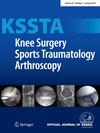Health-related quality of life for children with anterior cruciate ligament deficiency: Ensuring content validity of the new KIDS-KNEES-ACL questionnaire
Abstract
Purpose
The existing knee-specific pediatric patient-reported outcome measures (PROMs) lack content and construct validity for children with anterior cruciate ligament (ACL) injury. This impairs their accuracy which can lead to false interpretations of data and inaccurate clinical guidelines. The purpose of this study was to develop a content-valid PROM for children with an ACL injury.
Methods
The process adhered to the COnsensus-based Standards for the selection of health Measurement INstruments guidelines for PROM development. Informants were children with ACL deficiency and sampled based on age, sex, and treatment. Semistructured interviews were conducted exploring themes within the International Classification of Functioning, Disability and Health model. Interviews continued beyond data saturation. By thematic analysis and by probing items from the adult PROM ‘KNEES-ACL’, new themes and items emerged. Content coverage, relevance and understandability were continuously evaluated. All interviews were recorded and transcribed verbatim. The NVivo 12 software was used for data analysis and coding of items.
Results
A PROM of 60 items across nine subscales was formed. From cognitive interviews, 19 new items emerged. Forty-one of 55 items from KNEES-ACL were endorsed as relevant; however, all required rewording to ensure understandability. Substantial differences in the psychosocial impact between adults and children were observed. The children experienced a more considerable negative psychosocial impact caused by a loss of participation in sports, lower self-confidence and loss of social networks. This resulted in four new domains. The physical issues were similar to adults, with few exceptions.
Conclusion
The ‘KIDS-KNEES-ACL’ 1.0 (qualitative version) was developed. This version will be subjected to psychometric analysis, resulting in adequate measurement properties of the final KIDS-KNEES-ACL 2.0. As the only adequate pediatric ACL-specific PROM, its use in clinical trials and databases will enhance PROM data quality, and strengthen clinical guidelines and thus the treatment of children with ACL injury.
Level of Evidence
Not applicable




 求助内容:
求助内容: 应助结果提醒方式:
应助结果提醒方式:


